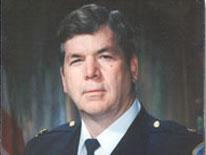
Chief of Police (July 1995-November 1997)
Born in Surveyor, West Virginia, Larry Soulsby joined the police department in 1971 and was a foot officer in the Fourth District before moving to the Crime Analysis unit. He was promoted to sergeant in 1976 and started his rise through the ranks. He held positions in Planning and Budget, and Public Information, and after being promoted to captain he served as the Commander of the Homicide Branch in 1984. During his tenure in the Homicide Branch the closure rate for cases was maintained at a steady seventy percent. In 1988 he was promoted to inspector and became the Director of the Disciplinary Review Division.
Inspector Soulsby was promoted to Deputy Chief in 1991 and became the Commander of the 3rd District, where he introduced Community Empowerment Policing. He was then transferred to the Patrol Services Division where he was eventually promoted to Assistant Chief in 1994, and became the commanding officer of the Patrol Services Bureau where he supervised the bulk of the personnel in the police department.
Following Chief Thomas’s resignation, Assistant Chief Soulsby was made interim chief and was the favored person to replace Chief Thomas. He had over twenty years of experience and had worked in a variety of units over his career. There were some questions about a white police chief supervising a predominantly black police force in a predominantly black city, but Mayor Marion Barry and others felt that Soulsby’s experience and abilities transcended race.
Chief Soulsby took the reins during one of the police department’s most difficult eras, as pay steps were frozen, salaries were reduced, and over 600 hundred experienced officers would leave the department through retirement, early outs and resignation. During his tenure as chief, his office was beset by controversy, and there was an unprecedented string of in the line of duty deaths, through which he had to guide a beleaguered department.
Chief Soulsby worked to get officers better training as he focused on prevention rather than reaction. He was to oversee the implementation of the new juvenile curfew law, and the redefining of how the police department approaches crime fighting.
The Financial Control Board, put in place to help the city and its failing agencies work through the financial crisis, oversaw the management of departmental resources and hired the consulting group Booz-Allen Hamilton to help revamp training and crime fighting approaches. This lead to the creation of the Patrol Service Areas and the redesigning of the traditional patrol beats.
Unfortunately, internal and external controversy over personnel moves and demotions had become distractions. Chief Soulsby was allegedly the first Chief to demote an assistant chief back down to the rank of Captain. Then in 1997, a police Lieutenant, who was a close friend of Chief Soulsby, was indicted on charges stemming from a blackmail scheme.
Chief Soulsby, who was never connected to any wrongdoing, resigned and retired to private life. His resignation paved the way for a far reaching search for a new police chief; a search that would be primarily focused outside of the Metropolitan Police Department.
